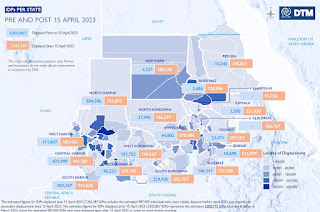ICC Prosecutor @KarimKhanQC briefs the @UN Security Council on the situation in Darfur, Sudan live from New York on Monday, 27 January 2025.
Watch now @UNWebTV here:Read the full report, 27 January 2025:
Fortieth report of the Prosecutor of the International Criminal Court to the United Nations Security Council pursuant to Resolution 1593 (2005)
Source: Office of the Prosecutor | Contact: OTPNewsDesk@icc-cpi.int
_________________________________
Related report
From The Associated Press
By EDITH M. LEDERER
January 28, 2025, 2:38 AM GMT - full copy:
ICC prosecutor seeking arrest warrants for those accused of atrocities in Sudan’s West Darfur region
UNITED NATIONS (AP) — The prosecutor of the International Criminal Court announced Monday that his office will be seeking arrest warrants for those accused of atrocities in Sudan’s West Darfur region, which has seen reported ethnic cleansing by paramilitary forces that have been fighting government forces for 19 months.
Karim Khan told the U.N. Security Council that crimes are being committed in Darfur “as we speak and daily” and are being used as a weapon of war. He said that conclusion is the result of “a hard-edged analysis” based on evidence and information collected by his office.
Sudan plunged into conflict in mid-April 2023, when long-simmering tensions between its military and paramilitary leaders broke out in the capital, Khartoum, and spread to other regions, including the vast western Darfur region.
Two decades ago, Darfur became synonymous with genocide and war crimes, particularly by the notorious Janjaweed Arab militias, against populations that identify as Central or East African. Up to 300,000 people were killed and 2.7 million were driven from their homes.
Khan told the council in January there were grounds to believe both government forces and the paramilitary Rapid Support Force, which was born out of the Janjaweed, may be committing war crimes, crimes against humanity or genocide in Darfur.
The Biden administration, just before it left office this month, determined that the RSF and its proxies are committing genocide in Sudan’s civil war. And the ICC prosecutor told the council Monday that there are “very clear echoes” in the current conflict of what happened 20 years ago.
“The pattern of crimes, the perpetrators, the parties, tracked very closely with the same protagonists, the same targeted groups as existed in 2003” and led the Security Council to refer Darfur to the ICC, Khan said. “It’s the same communities, the same groups suffering, a new generation suffering the same hell that has been endured by other generations of Darfuris, and this is tragic.”
Human Rights Watch in a major report last May said the Rapid Support Forces and their allied militias carried out attacks against the ethnic Masalit and other non-Arab groups in El Geneina, the capital of West Darfur state, from April to June 2023, with attacks intensifying that November.
At least thousands of people were killed and hundreds of thousands displaced during the attacks, according to the report by the leading rights group.
“I can confirm today that my office is taking the necessary steps to put forward applications for warrants of arrest in relations to crimes we allege are being committed and have been committed in West Darfur,” Khan told the council on Monday.
He gave no details on the specific crimes or the people the ICC wants arrested. But he did say his office is particularly concerned about a stream of allegations of gender crimes against women and girls, which he said were “a priority” for the ICC.
He said the last six months have seen “a tailspin into deeper suffering, deeper misery for the people of Darfur,” with famine present, conflict increasing, children targeted, girls and women subjected to rape and the whole landscape “one of destruction.”
Khan had a simple message for those on the ground in El Geneina in West Darfur, the city of El Fasher in North Darfur, which is besieged by RSF forces, and elsewhere in Darfur: “Now, better late than never, for goodness sake, comply with international humanitarian law, not as a charity, not out of some political necessity, but out of the dictates of humanity.”
Khan told the council he made efforts to engage with the RSF to obtain information relevant to the ICC’s investigations, and members of his office met with representatives of the paramilitary force last week.
“I do expect, and hope, and require swift and meaningful action, and will be monitoring that,” he said.
View original: https://apnews.com/article/icc-sudan-darfur-war-government-rsf-arrest-11f17e7d3bb3f2d48c4debb3ebb906a3


